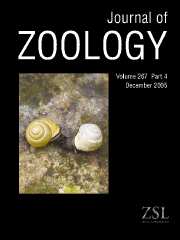Article contents
Recrudescence of sexual activity in a colony of the Mashona mole-rat (Cryptomys darlingi): an apparent case of incest avoidance
Published online by Cambridge University Press: 14 June 2001
Abstract
Colonies of the Mashona mole-rat Cryptomys darlingi are founded from a single reproductive pair of animals that are genetically unrelated by descent. All non-reproductive animals are the progeny of the reproductive pair. Non-reproductive colony members do not seem to be suppressed from reproduction at the level of the pituitary. In colonies in which the reproductive female is removed or dies, there is strict incest avoidance and the colony remains reproductively quiescent. Reinstatement of sexual activity in a queenless colony may be brought about in the laboratory by the introduction of unfamiliar and unrelated adult males. In the queenless colony under study, there was a marked change in the dominance hierarchy with an increase in Landau's index of linearity from 0.61 to 1.0 on the introduction of two unrelated males. The two new males became the most dominant within the colony. All previously non-reproductive females exhibited heightened urinary oestradiol 17β and progesterone concentrations on the introduction of the males. However, it was only the older and most dominant non-reproductive female that became the new reproductive female and produced a litter of three pups 70 days after the initial introduction.
Information
- Type
- Research Article
- Information
- Copyright
- 2001 The Zoological Society of London
- 10
- Cited by

